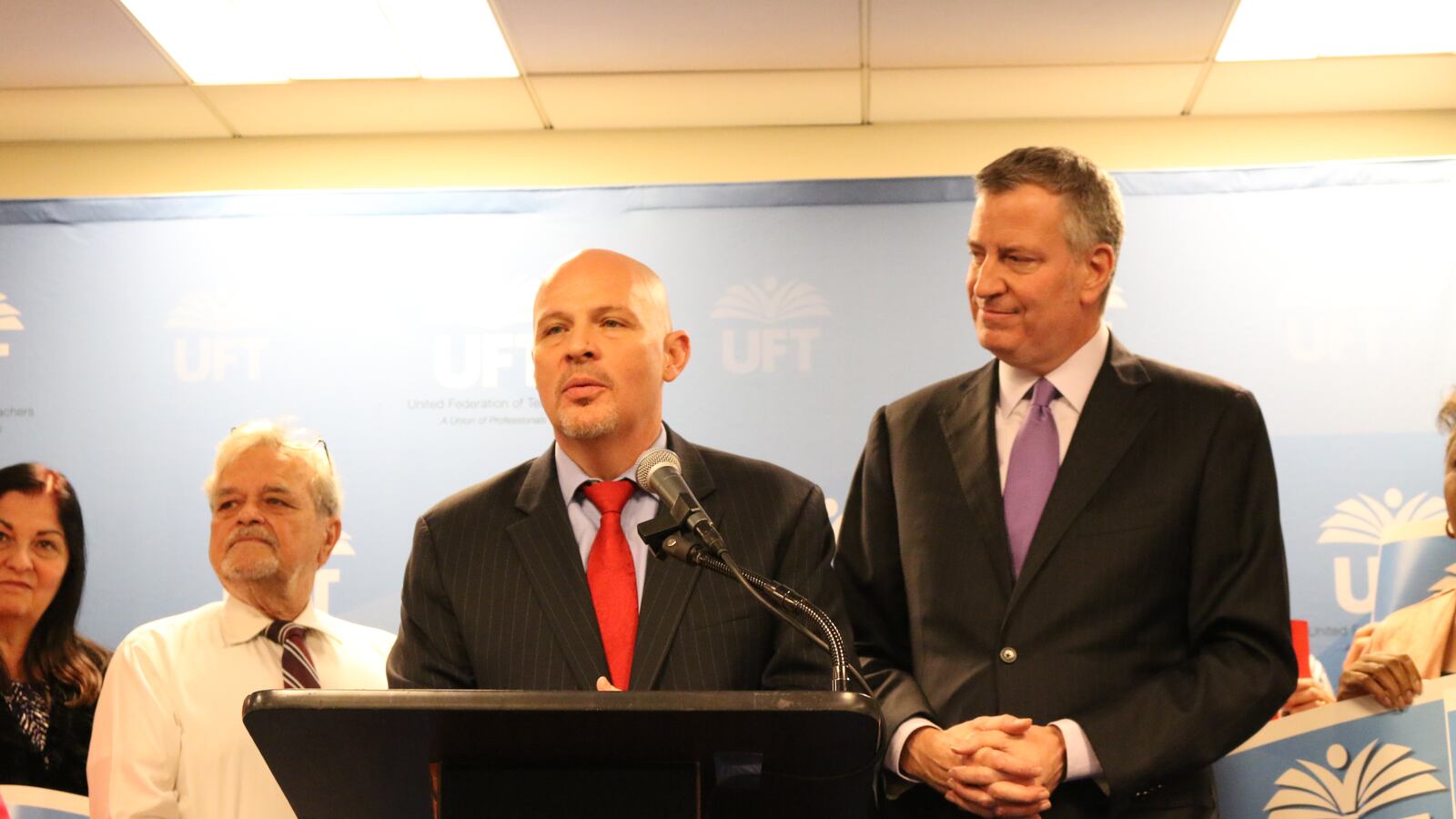The head of New York City’s teachers union offered a bleak assessment of Mayor Bill de Blasio’s plan to integrate the city’s specialized high schools Thursday, saying it likely won’t come to fruition any time soon and the plan’s rollout was “fraught with mistakes.”
“I don’t believe at this point in time it can pass in the next legislative session because it has been so highly politicized,” Michael Mulgrew, president of the United Federation of Teachers, said during a panel discussion hosted by City & State and moderated by Chalkbeat.
Mulgrew’s comments underscore the challenge ahead for de Blasio’s plan, which calls for eliminating the single test that determines admission at eight of the city’s top high schools and instead admitting the top 7 percent of students at every middle school across the city. At three of those high schools — Stuyvesant, Brooklyn Tech, and Bronx Science — state law mandates the use of a single exam for admission. (The legislative session begins in January.)
New York’s schools are among the most segregated, and de Blasio has elevated specialized schools as a key symbol of that problem. Although nearly 70 percent of the city’s public school students are black or Hispanic, just 10 percent of offers to specialized schools go to those students.
Mulgrew’s comments are particularly striking because the union has previously advocated for minimizing the role of the Specialized High School Admissions Test in favor of other admissions methods — and the union chief has rarely clashed publicly with de Blasio. (Mulgrew noted that he will still push state lawmakers to deemphasize the SHSAT in admissions.)
Meanwhile, Mark Treyger, chairman of city council’s education committee who was also part of the panel discussion, said that he was not informed of the plan before it was announced and said he does not support it because it would only promote racial diversity in a tiny fraction of the city’s schools.
“I’m still waiting for the bigger vision and the bigger plan,” Treyger said.
Here are three other highlights from the discussion, which also included State Education Commissioner MaryEllen Elia.
A Richard Carranza report card
All three leaders gave schools Chancellor Richard Carranza high marks. Elia, who referred to Carranza as a “soul mate” with the state on equity issues, said she admired his commitment to using data to inform policy decisions.
“If you noticed, he kept saying ‘look at the data’ and I think that’s what we need to be driven to do,” Elia said. That’s in stark contrast with Carranza’s predecessor, Carmen Fariña, who famously said that she valued stories, not statistics, as measures of the school system’s health.
Yeshivas on the state’s ‘agenda’
State officials plan to offer guidance to the city’s education department about its three-year investigation of ultra-Orthodox yeshivas sometime in the next two months. That comes on the heels of a letter Carranza sent to Elia last week that said certain city yeshivas appeared to offer little secular instruction and denied city investigators access to 15 others — but ultimately asked the state education department for advice on what to do next.
Without mentioning yeshivas directly, Elia said she was glad that advocacy groups had raised the issue of whether certain private schools are offering a “substantially equivalent” education as public ones. “There has been some reviews of particular types of schools from advocacy groups,” she said. “That’s putting, certainly, the agenda on the page for all of us.”
What’s next for teacher evaluations?
State lawmakers failed to overhaul the state’s teacher evaluation law during its last session, and if no action is taken test scores would once again be tied to teacher ratings in 2019 — a policy that has fueled a vigorous political opposition across the state.
Elia said the state planned to restart its efforts to craft a new evaluation system with input from teachers, and strongly hinted that the Board of Regents could extend the ban on using test scores in evaluations until a new plan is ready.
“This is not something that should happen in a very fast timeline,” Elia said. “It should be thoughtful.”
For his part, Mulgrew suggested a faster approach might be appropriate. “If nothing happens by the end of next school year then we go back to ‘everything’s about the test,’” he said. “I’m pretty sure that no matter what side of the debate you’re on in New York State, nobody wants to go back to that.”

